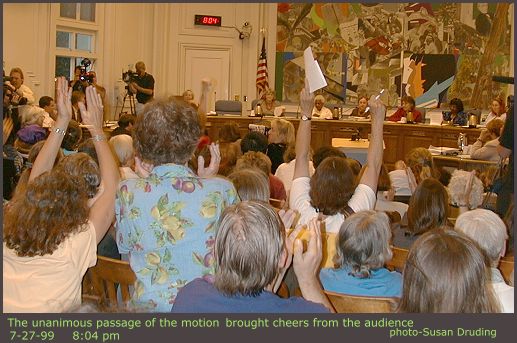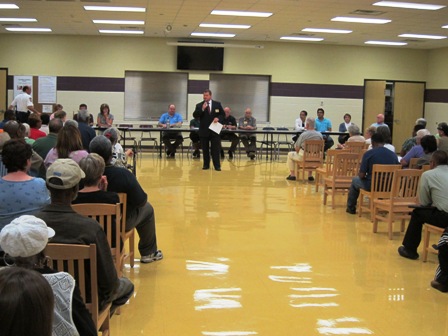
In the beginning, we have the Developer and the Builder. Then construction takes place, and the roads, infrastructure, amenities and homes emerge. Finally, the homeowners move into their homes, creating a sense of community.
Throughout the development years, the Developer and Builder are the most visible individuals in contact with the local government. Once the Association is in full swing with resident homeowners, the Association's contact with local government often dwindles and in most instances, completely vanishes. Reversing this trend is an important issue for your Association.
Recognizing the need to work with your government officials will be an advantage in maintaining and enhancing the quality of life for your community. Please note that many of the local development ordinances mirror your own Association standards and criteria. When reviewing your zoning and design guidelines, it is not unusual to find that the goals and objectives of the municipality parallel those of your Association. Previously adopted and implemented local ordinances ensure that a community is developed with consistency and provide aesthetic appeal as well.
Development and Local Government
One way to increase your influence with your local government is to understand how the development process works (in other words, speak their language). For instance, did you ever wonder how your particular community began? The development process is much like the homeowner association's architectural review procedure, as shown:
- The Developer or Builder (Applicant) presents a concept plan of the subdivision (usually called the Preliminary Plat). This plan provides detailed engineering and design data. Review of the Preliminary Plat determines if the project complies with local, state and federal law including the jurisdiction's zoning ordinances and comprehensive development plan.
- Once reviewed by local officials, the Preliminary Plat is referred to the Planning Commission (generally a volunteer group of residents) or other governmental entity for evaluation. The Planning Commission usually holds a hearing for public input on the Preliminary Plat before taking action.
- After the Preliminary Plat is approved, the Applicant submits a Final Plat, which includes recording information, assurances, survey certification, dedication of common areas and streets, plat conditions and signature blocks denoting municipal approval and acceptance of the plat.
- After Final Plat approval, the Developer/Builder applies for various permits. One key component is the requirement to post assurances (financial bonds) to ensure the infrastructure is completed per the plans. What happens as construction nears the end and the last homes are being built? The Developer/Builder will request a Release of Assurances. As an Association, your involvement at this final stage, prior to Release of Assurances, is the first step for the future of your Community in regards to infrastructure improvements.

Get Involved in Local Government!
What can your Association do to initiate this vital connection? Involve your Association in significant governmental matters! Sign up for email notices announcing upcoming municipal meetings that will affect your Community (zoning changes, general plan updates, architectural ordinances). Attend regular meetings of your local government and make contact with the dignitaries. Consider engaging your management company to keep track of development plans or to attend City Council meetings on behalf of the Association in order to inform homeowners of current or future development impacting your area. (There may be an extra fee for this service if it is not included in the scope of your management contract.)
If your Association has a small membership (or even if it is has a large membership), it might prove beneficial to contact other associations within your geographic area to form a Neighborhood Association. Many local government entities readily recognize and are supportive of the establishment of Neighborhood Associations. A Neighborhood Association is a voluntary organization of residents who work together to improve and maintain the quality of life in their neighborhood. These Associations typically develop as a result of concern regarding a particular issue or as a means of enhancing the "sense of community" in the neighborhood. Neighborhood Associations are different than Homeowners Associations. Neighborhood Associations are public organizations that provide advice and recommendations regarding relevant neighborhood issues, particularly those of safety and quality of life concerns. A Neighborhood Association usually consists of members from several subdivisions, which may or may not be affiliated with a homeowners association. How can your Association be involved in issues related to your community through a Neighborhood Association?
- By scheduling regular meetings in which homeowners can interface with their government officials
- By providing guest speakers who address key issues that impact member communities
- By providing meaningful input regarding major issues (traffic, environment, zoning, etc.) through advisory groups
- By hosting educational forums on referendums and the platforms of political candidates
Most municipalities now have websites with links to Neighborhood Associations. They are more than willing to provide your Association with visibility on their website.
Benefits of Connecting to Local Government
Your involvement with your municipality should not be limited to matters such as rules and regulations, speed limit enforcement or neighbor disputes. A great way to connect with your local government is to participate in community promotions. The Fort Lauderdale City Commission, in working with Neighborhood Associations, has created the Community Appearance Board (CAB). In an effort to promote an aesthetic environment , CAB publicly recognizes projects that positively affect the geographic area of the association through the Community Appearance Awards. Another great incentive in the Fort Lauderdale area that involves both the municipality and the homeowners is the WOW Awards program. The monthly WOW Award is presented in recognition of residential properties located throughout the city that contribute to the aesthetic appeal of their respective area. The monthly winner, which is selected by CAB Board Members, is commended for maintaining a home that represents excellence in its exterior beauty, style and landscaping.
If your Association has a new Board of Directors or if the association has been in existence for a while, chances are you will, in time, need the expertise and assistance of your local government. Take the initiative today to connect with your local government and reap the many rewards of careful planning, diligent oversight, and neighborly cooperation.
 Print
Print Email
Email







